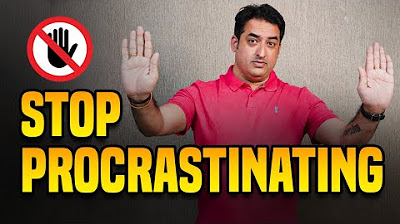7 Years of Learning in 12 Minutes: Secrets of Productivity
Summary
TLDRThe transcript covers various productivity rules and techniques such as the 2-minute rule to tackle small tasks immediately, the rule of 72 to make better decisions, daily highlight to prioritize the most important task, asking 'who' instead of 'how' to utilize help, the 80/20 rule to identify and focus on vital tasks, eating the frog first to tackle the biggest task early, Parkinson's law to work faster under tighter deadlines, outcome visualization to maintain motivation, the Pomodoro technique for better focus, salami slice method to break overwhelming tasks down, and getting adequate rest and sleep which is the most productive thing one can do in a day.
Takeaways
- 😀 The 2-minute rule states that if a task takes less than 2 minutes, you should do it immediately.
- 😊 The Rule of 72 says to not make decisions when you're emotionally compromised; wait at least 72 hours.
- 🤔 Set a daily highlight to choose one main task to prioritize and commit to completing each day.
- 🧐 Ask 'who' instead of 'how' when you have a task, to tap into others' expertise and focus on your strengths.
- 😯 Pay attention to what you procrastinate on - it signals what you should delegate or get help with.
- 🥳 Spend the first 90 minutes each day focused on your most important goal during peak productivity.
- 😎 Identify the 20% of activities delivering 80% of your results, and focus efforts there.
- 🤓 Batch process similar tasks together to maximize efficiency.
- 💡 Break overwhelming tasks into smaller pieces and commit to just one piece at a time.
- 📝 Carry a notebook to capture creative solutions that come from your subconscious.
Q & A
What is the 2-minute rule and what is the main idea behind it?
-The 2-minute rule states that if a task takes less than 2 minutes to complete, you should do it immediately instead of putting it off. The main idea is to prevent procrastination and unfinished tasks from accumulating.
What does the rule of 72 state?
-The rule of 72 states that you should never make an important decision when you are hungry, angry, tired or lonely. Instead, wait at least 72 hours so you can approach the situation calmly and rationally.
What is the purpose of setting a daily highlight?
-Setting a daily highlight means choosing one main task to prioritize and commit to completing each day no matter what. The purpose is to provide focus and a sense of accomplishment even on busy days.
How can asking "who" instead of "how" improve productivity?
-Asking "who can do this?" instead of "how can I do this?" allows you to tap into other people's expertise, saves you time, and lets you focus on what you are best at.
What does the 991 rule entail?
-The 991 rule states that for the next 90 days, spend the first 90 minutes of your day focused on one task that will help you achieve your goals. This creates consistency and urgency.
What is the core idea behind Parkinson's Law?
-Parkinson's Law states that work expands to fill the time available for its completion. By setting shorter deadlines, you increase productivity.
What is the 80/20 rule and why is it important?
-The 80/20 rule says 80% of your results come from 20% of your activities. Identifying and focusing on those vital 20% results in greater productivity and impact.
What is the purpose of time auditing?
-Time auditing involves recording how you spend your time to understand where you can improve efficiency.
How does the Pomodoro technique suggest managing time?
-The Pomodoro technique suggests working focused on one task for 25 minutes, then taking a 5-minute break, and repeating this cycle a few times before taking a longer 30 minute break.
Why is rest and sleep considered the most productive thing you can do?
-Adequate rest and sleep significantly improve brain function and productivity for the next day. It recharges both the body and mind.
Outlines

This section is available to paid users only. Please upgrade to access this part.
Upgrade NowMindmap

This section is available to paid users only. Please upgrade to access this part.
Upgrade NowKeywords

This section is available to paid users only. Please upgrade to access this part.
Upgrade NowHighlights

This section is available to paid users only. Please upgrade to access this part.
Upgrade NowTranscripts

This section is available to paid users only. Please upgrade to access this part.
Upgrade NowBrowse More Related Video

Rahasia PAKSA Otak Ngegas Lagi! 5 Trik Manipulasi Biar Gak Pernah Malas Lagi!

Stop Procrastinating | 13 Best Time Management Techniques | Increase Productivity #productivityhacks

7 Anos de Aprendizado em 14 Minutos: Segredos da PRODUTIVIDADE

Eat That Frog by Brian Tracy: Animated Book Summary

14 ways to MANAGE your TIME BETTER in 2024! GIVEAWAY ALERT! | Ankur Warikoo Hindi

Tips to Structure Your Day | Brian Tracy
5.0 / 5 (0 votes)